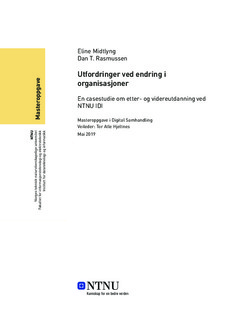Utfordringer ved endring i organisasjoner En casestudie om etter- og videreutdanning ved NTNU IDI
Master thesis
Permanent lenke
http://hdl.handle.net/11250/2609594Utgivelsesdato
2019Metadata
Vis full innførselSamlinger
Sammendrag
For å tilpasse seg politiske fokusområder og stadig økende krav til ny kompetanse i samfunnet, har Norges teknisk-vitenskapelige universitet (NTNU) besluttet å videreutvikle og øke sitt tilbud for etter- og videreutdanning (EVU). Det innebærer en omorganisering av EVU slik man kjenner det i dag, og vil implisitt bety at flere ansatte må bidra til EVU.
I den forbindelse er det iverksatt tiltak på instituttnivå, dette for å se på muligheter for å sikre en samlet og strategisk utvikling av EVU-tilbud. Satsingen innebærer en endring, som kan påvirke samhandling, kulturelle verdier og menneskelig forhold. Dette danner grunnlaget for vår undersøkelse, hvor vi ønsker å besvare følgende problemstilling: Hvordan kan NTNU IDI løse organisatoriske utfordringer når de skal videreutvikle sitt EVU-tilbud?
Formålet med denne masteravhandlingen er å se på hvilke organisatoriske utfordringer som Institutt for datateknologi og informatikk (IDI) nå står overfor, i forbindelse med videreutvikling av NTNUs EVU-tilbud. Vår rolle i denne sammenheng er å evaluere utfordringer og komme med anbefalinger og forslag til løsning på de ulike utfordringene. For å belyse problemstillingen er det videre utformet tre forskningsspørsmål som besvares med utgangspunkt i organisasjonslitteratur, med avgrensning til tema som samhandling, organisasjonskultur og motivasjon. I casestudiet benyttes i hovedsak kvalitative metoder, med utgangspunkt i dybdeintervju. I tillegg er det også gjennomført en spørreundersøkelse, og vi kan dermed utnytte fordeler som metodetriangulering kan medføre.
Studien viser at på tross av opplevde utfordringer og usikkerhet, virker ansatte motiverte og villige til å bidra innen EVU, så lenge ulike forhold ligger til rette. Det vil bli avgjørende å skape et miljø for samhandling, og at ansatte ved organisasjonen inkluderes i prosessen i større grad. I tillegg vil støtte fra ledelsen være viktig. Disse faktorene vil være avgjørende for videreutviklingen av EVU. In order to adapt to political focus areas and ever-increasing demands for new competence in society, the Norwegian University of Science and Technology (NTNU) has decided to further develop and increase its continuing education (EVU) offering. It involves a reorganization of EVU as it is today, and will implicitly mean that more employees must contribute to EVU.
Measures have been implemented at departmental level, in order to look at opportunities to ensure an overall and strategic development of EVU services. The initiative entails a change, where it will be important to facilitate better organization, safeguard cultural values, focus on involvement and human relationships. This forms the basis for our thesis, where we want to answer the following issue: How can NTNU IDI solve organizational challenges with the further development of the EVU offer?
The purpose of this thesis is to look at various challenges that the Department of Computer Science and Informatics (IDI) is now facing in connection with the further development of NTNU's EVU offering. Our role in this context is to evaluate challenges and make recommendations and suggestions for solving various organizational challenges. In order to elucidate the issue, three research questions have also been formulated. They will be answered on the basis of organizational literature, with a delimitation of topics such as collaboration, organizational culture and motivation. The case study mainly uses qualitative methods, based on in-depth interviews. In addition, a survey has also been carried out, and we can thus exploit the advantages that triangulation can bring.
The study shows that in spite of the challenges and uncertainties experienced, employees seem motivated and willing to contribute within EVU, as long as different conditions are met. It will therefore be crucial to create an environment for collaboration, and that employees in the organization are included in the process to a greater extent. Also, the management support will be of great importance. These conditions will be essential if the prioritization of EVU is to be successful.
